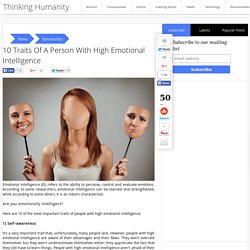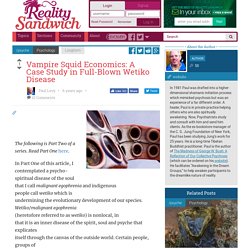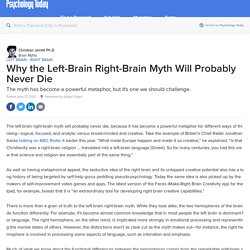

Tavistock Institute. 8 Tips for Amateur Psychologists Tempted to Analyze Out Loud. Childhood Trauma, Affect Regulation, and Borderline Personality Disorder. Psychopathy/Sociopathy. The Labyrinth of the Psychopath. Love isn't something you just fall into.... - Psychology Today. 10 Traits Of A Person With High Emotional Intelligence. Emotional intelligence (EI) refers to the ability to perceive, control and evaluate emotions.

According to some researchers, emotional intelligence can be learned and strengthened, while according to some others, it is an inborn characteristic. Are you emotionally intelligent? Here are 10 of the most important traits of people with high emotional intelligence: 1) Self-awareness It's a very important trait that, unfortunately, many people lack. 2) Optimism People with high emotional intelligence tend to focus on the positive aspects of life. 3) Curiosity Curiosity is one of the most common traits that people with high emotional intelligence have. 4) Understanding Empathy helps people with high emotional intelligence to become the best friends. 5) Accuracy All people experience emotions, but it is a select few who can accurately identify them as they occur. 6) Presence of mind This means that people with high emotional intelligence don't take fear so seriously. 7) Motivation.
The Greatest Epidemic Sickness Known to Humanity. The following is Part One in a series.

Read Part Two here. In the book Columbus and other Cannibals, indigenous author Jack D. Forbes lucidly explores a psychological disease that has been informing human self-destructive behavior that Native American people have known about for years. After reading his book, it was clear to me that he was describing the same psycho-spiritual disease of the soul that I wrote about in my book, The Madness of George W. Bush: A Reflection of our Collective Psychosis. As if performing a magic ritual, in exploring the entity of wetiko, we first have to invoke its spirit and enter into relationship with it. After evoking an entity like wetiko, in order to study it as objectively as possible, we have to hermetically seal it within an alchemical container. A Disease of Civilization Wetiko/malignant egophrenia is a disease of civilization, or lack thereof.
A Parasite of a Different Order Alien Intrusion To quote Don Juan, "Indeed we are held prisoner! Vampires. Vampire Squid Economics: A Case Study in Full-Blown Wetiko Disease. The following is Part Two of a series.

Read Part One here. In Part One of this article, I contemplated a psycho-spiritual disease of the soul that I call malignant egophrenia and indigenous people call wetiko which is undermining the evolutionary development of our species. Wetiko/malignant egophrenia (heretofore referred to as wetiko) is nonlocal, in that it is an inner disease of the spirit, soul and psyche that explicates itself through the canvas of the outside world.
Certain people, groups of people, corporate bodies, or nation-states embody and act out this psychological malady in the world. Specific situations in the world, such as the destruction of the Amazon rainforest by myriad multi-national corporations, or Monsanto instituting terminator seeds as it tries to gain control of the production of the food supply, are real-life enactments, both literally and symbolically, of this self-destructive, inner process. 0deec5337810b1caaa000000.
Carl Jung. Obsessive Debunking Disorder (ODD)? By Thomas Sheridan | Thomas Sheridan Arts Are Hardcore Skeptics and Debunkers Actually Brain Deficient?

Their Own Beloved Hard Science Might Well Suggest Many Are. We have all encountered them. The men and women of reason. The self-appointed guardians and vanguards of materialist dogma along with their absolute faith and belief in official government and corporate press releases. Conformity. Why the Left-Brain Right-Brain Myth Will Probably Never Die. The left-brain right-brain myth will probably never die because it has become a powerful metaphor for different ways of thinking – logical, focused and analytic versus broad-minded and creative.

Take the example of Britain’s Chief Rabbi Jonathan Sacks talking on BBC Radio 4 earlier this year. “What made Europe happen and made it so creative,” he explained, “is that Christianity was a right-brain religion … translated into a left-brain language [Greek]. Kübler-Ross model. The model was first introduced by Swiss-American Psychiatrist Elisabeth Kübler-Ross in her 1969 book, On Death and Dying, and was inspired by her work with terminally ill patients.[1] Motivated by the lack of curriculum in medical schools on the subject of death and dying, Kübler-Ross began a project which examined death and those faced with it while working as an instructor at the University of Chicago's medical school.

Kübler-Ross' project evolved into a series of seminars which, along with patient interviews and previous research became the foundation for her book, and revolutionized how the U.S. medical field takes care of the terminally ill. In the decades since the publication of "On Death and Dying", the Kübler-Ross concept has become largely accepted by the general public; however, its validity has yet to be consistently supported by the majority of research studies that have examined it[citation needed]. Stages[edit] The stages, popularly known by the acronym DABDA, include:[2]